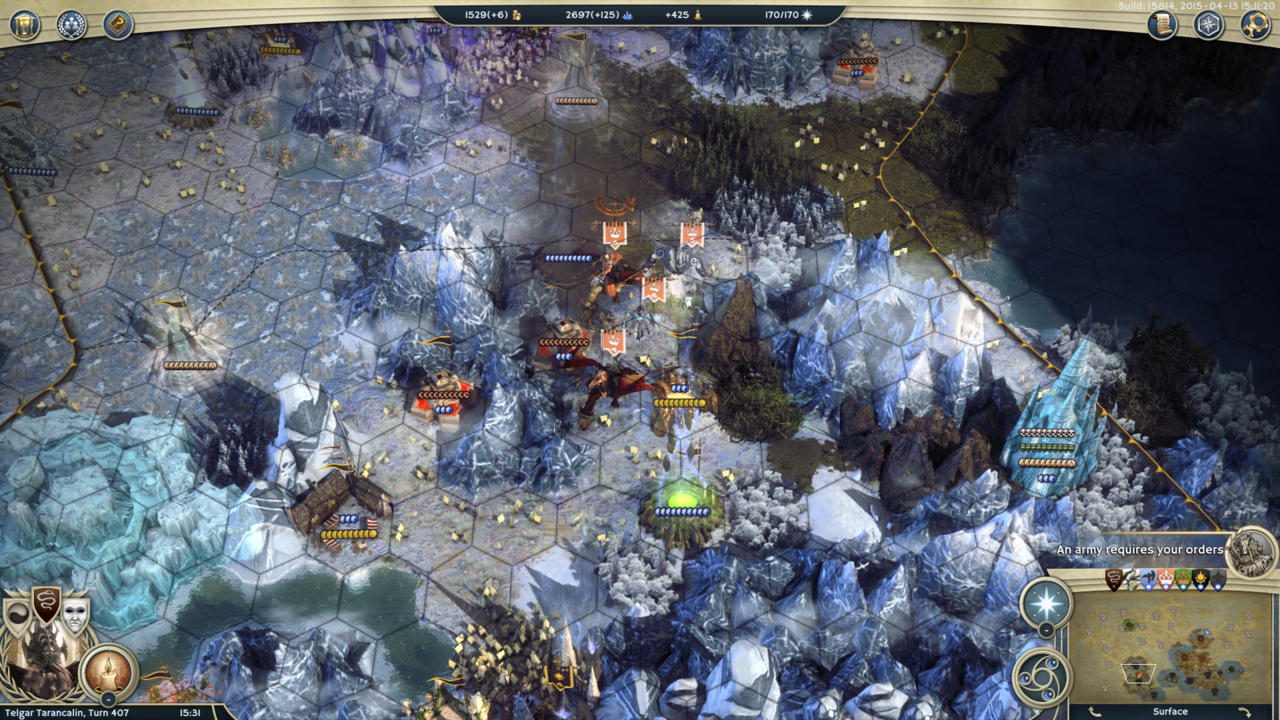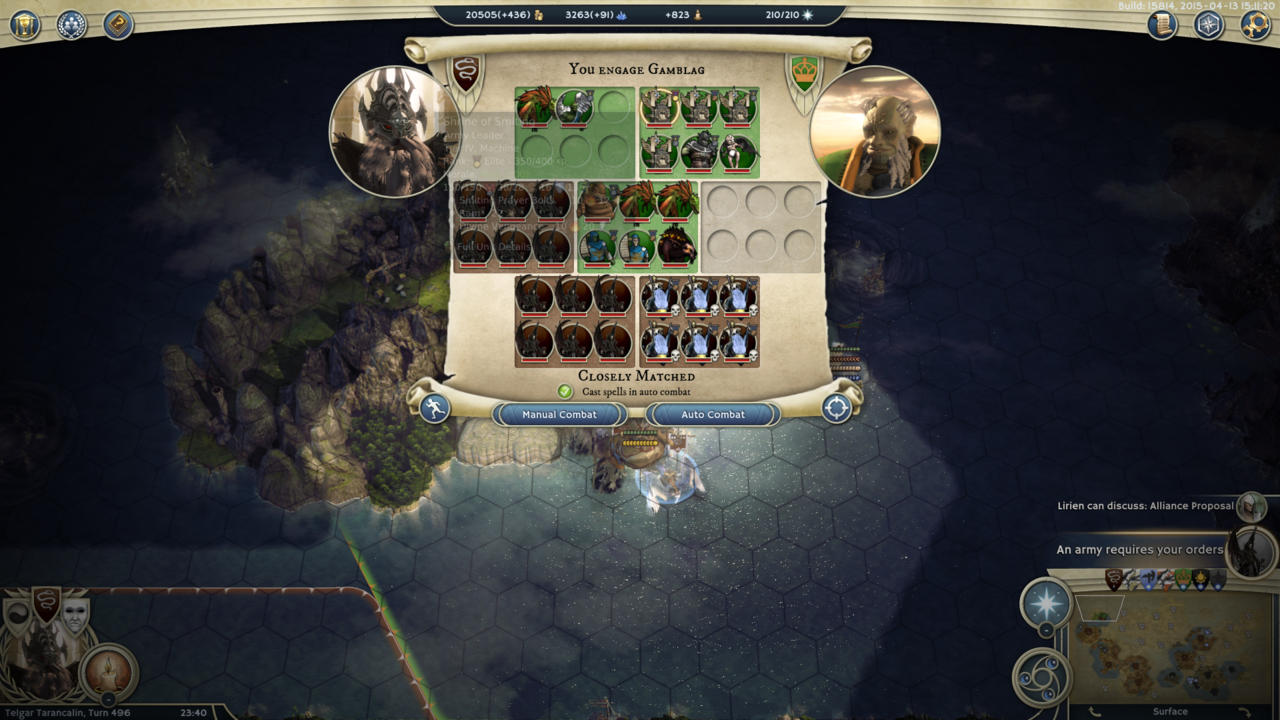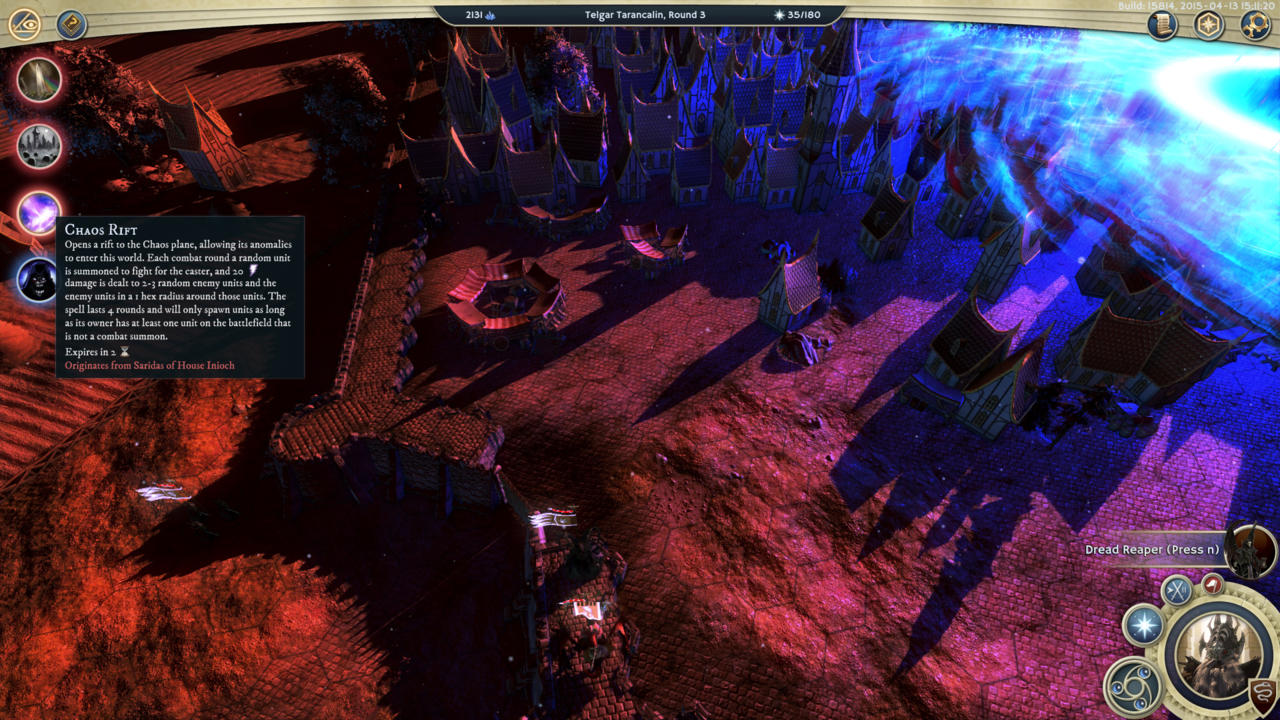I founded my empire in the depths of the earth. As it grew, I built it with the bones and rotting corpses of the subterranean dwarven kingdoms. For millennia, I crafted my undead legions, preparing to crawl out of the caves and rock and wage war on the evil in the world. That's right. My zombie army was good and holy, wanting nothing more than to create a unified world government founded on the principles of cooperation, trade, and kindness.
Age of Wonders III encourages this type of emergent, player-centric storytelling. The more I play, the more I realize that its strengths come from the unique melding of role-playing and turn-based strategy. It trusts you to create your own rich role-playing experiences and lets you control the narrative through empire-building and a robust tactical battle system. The result is a vibrant, special game that is ruthlessly entertaining. Age of Wonders III's latest expansion bolsters an already exceptional core with more races to play, a better grand-scale strategy, and an excellent morality system.

Eternal Lords trusts you to create your own rich role-playing experiences and lets you control the narrative through empire-building and a robust tactical battle system.
Those familiar with the Age of Wonders series, particularly the third installment, will immediately recognize the tactical/strategic duality driving each session. You'd bounce between macro- and micro-management, controlling both the direction and structure of your civilization as well as the outcome of individual battles. However, that two-stage system is hard for any game to pull off well, and it was one of Age of Wonders' weakest points. While tactical bouts had plenty of variety and the available options made matches thrilling and tense, the large-scale planning lacked depth, leading to a lackluster half. Eternal Lords finally brings enough new features to flesh out the game and cover almost all the base game's weaknesses.
For starters, two new races (the Frostlings and the Tigrans) are added to the basic Dwarves and Elves. Both have a visual flair and uniqueness all their own. Frostlings, for example, are an offensive race with bonuses for ice magic. They dwell in cold areas and can take advantage of often-barren land to launch raids on more temperate cultures. Tigrans are their natural foil. Based on the mythology of ancient Egyptian culture, they are a quick, desert-dwelling class of felines. They worship the sun and idolize the duality of nature. To wit, Tigrans specialize in necromancy, and they worship the dead as well as the living. This makes Tigrans an ideal pairing for Eternal Lords' new class--the Necromancer.
In the base Age of Wonders III game and the first expansion, players chose both the race and class of their young nation's leader. Because a good chunk of the game was modeled after Dungeons and Dragons and similar fantasy settings, the classes were standard fare: rogues, warlocks, and warriors. Necromancers are a bit different. Whereas the others fit into standard heroic archetypes, fiction has always associated the art of controlling the minds and bodies of the dead with evil. Let us not forget that in the original Hobbit novel, Tolkien created a necromancer character who bided his time until he could revive himself as the Dark Lord Sauron.
Age of Wonders III's latest expansion bolsters an already exceptional core with more races to play, a better grand-scale strategy, and an excellent morality system.
Suffice it to say, it's a strange premise to work into an empire-building strategy game. Even fictional conceptualizations of the undead lend themselves to a different system of goals and values. The dead, for example, don't care where they are or what they're doing. They're nigh unlimited as well because any war is likely to yield more soldiers to bolster your armies. Eternal Lords understands this and makes necromancy and its related magicks whole and distinct.
I spent the majority of my time with Eternal Lords leading an undead sect of dwarves below ground. I defended my cities with small bands who could summon up much larger armies from fallen warriors on the battlefield. They were a bit weaker than some other units, but I overwhelmed my enemy with sheer numbers. After a time, I gathered enough power to cast a massive spell that revived recently killed troops from around the world under my control. I had become a demigod, and my abrupt omnipresence spooked other world leaders. In short order, I flooded the surface with my abominations and championed the spread of good and kindness throughout the world. Again, it might sound incongruous, but it does a make a sort of sense when you consider how all of Eternal Lords' pieces fit together.
For example, the morality system facilitates a broad variety of play styles and leads to some distinct late-game units based on your alignment. The path of good is tied more to sparing the lives of the innocent and protecting the weak than it is to any cosmic moral authority. As such, I decided that my undead were like friendly vampires. They did what they needed to do, but they were more interested in establishing systems of cooperation with the hope that everyone else would willingly choose to become zombies at some point in the future.

To that end, I made friends with the other races, brought them under my protection, and governed them as well as I could. I eventually converted them, but they were almost always better for it. Those choices lead to a positive alignment in the game, and I won by unifying the globe in peace and harmony. You won't see any complex, ambiguous moral quandaries here, but it works as the foundation for a creative system to promote an interesting network of decisions and allegiances.
Tendencies towards openness and role-playing even show up in Eternal Lords' single-player campaign. Here, you'll play as Arvik, a necromantic Frostling. He is the heir to his kingdom's throne and is thrust into a complex political situation, forcing him to make a series of tough calls as he unlocks his abilities as a powerful wizard. Each new scenario presents you with important decisions regarding how you want to govern your people and what kind of leader you want to be. It's not the best writing around, but it does reinforce the themes of Eternal Lords' minute-to-minute play--engaging decisions.
Eternal Lords carries a few problems over from its core game. Worker units aren't terribly useful, for example, outside of building singular roads. Flying units can move around the battlefield without any kind of penalty, and because those are typically the strongest units (i.e., dragons), it can sometimes feel like you don't have much recourse against stronger opponents. That's balanced somewhat by the sterling tactical play, which rewards careful planning and gutsy gambles, but it still leaves something to be desired.

The morality system facilitates a broad variety of play styles and leads to some distinct late-game units based on your alignment.
Strategy game legend and Civilization creator Sid Meier once said, "Games are a series of interesting decisions." By that metric, Age of Wonders III: Eternal Lords is excellent. Your possibility space is vast, and you can craft your adventure and your nation in any number of ways. Systems of morality, player races and classes, and governance all work together to create an interlocking web of player-driven narrative potential. This expansion's only real weaknesses are those endemic to the structure of the base game, but Eternal Lords is a worthy follow-up and fresh take on the classic turn-based strategy game formula.